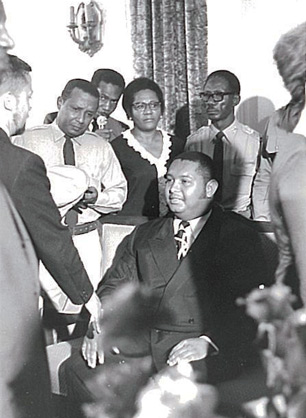WASHINGTON, Sept. 16 President Clinton's surprising reversal tonight, shifting from the brink of combat to the resumption of diplomacy, is grounded in a belief that the key to the Haitian crisis is the negotiated departure of the nation's military leaders, especially Lieut. Gen. Raoul Cedras.
On the surface, it is far from clear why Mr. Clinton has attached such a high priority to getting the three leaders out of the country peacefully, particularly when Defense Secretary William J. Perry said only this afternoon that invasion troops could dispatch the junta in a matter of hours.
Nonetheless, Mr. Clinton was willing to send a high-powered negotiating team to Port-au-Prince, headed by former President Jimmy Carter, even though it again made him look indecisive and inconsistent in foreign policy -- the very things for which he has been criticized throughout his Presidency.
On the other hand, the President has at least temporarily disarmed his critics. Lawrence F. Eagleburger, the former Secretary of State, commented tonight that "we all have to hope this succeeds, because the insanity of an invasion is something that we should not even have to contemplate."
After insisting on Wednesday that there would be no point to sending Mr. Carter to Haiti, after warning the Haitian triumvirate on Thursday night that "your time is up" and after preparing the American people in a television address for imminent military action, Mr. Clinton has now given the Haitian leaders more time.
The White House said it had received a signal from Port-au-Prince that the leaders were ready to talk about leaving if a special envoy was sent. But in an interview with wire service reporters this week, the President said, "There is nothing to meet about, unless they are leaving. If they are leaving, and they want to discuss things, well, that's a different issue."
A week ago, Mr. Carter had proposed the very mission announced today, and the White House turned him down. Senator Bob Dole of Kansas, the Senate minority leader, had also been pressing, without success, for what he described today as "a high-level emissary to Haiti, an emissary not with an ultimatum but with a mandate -- a mandate to seek a peaceful solution."
Now Mr. Clinton appears to be ready to talk before getting a promise that the three leaders will go. He has chosen to turn on his diplomatic radio, receiving a signal now after letting others vanish into the ether.
Pressed for an explanation, Administration officials say they believe that resistance to an invasion by Haitian military and paramilitary forces, which under any circumstances they do not expect to prove formidable, would be almost nonexistent if General Cedras and his two associates leave.
"We think it makes all the difference in the world," one official said. "There are a lot of bad actors, sure, but if the big three are gone, there's very little chance that they could generate any significant resistance. Remember, the countryside is very, very hostile to these people, and it's only Cedras and his friends who are able to organize this reign of terror."
That conclusion is based on an assessment by United States intelligence that was given to President Clinton in recent days, as well as the judgment of American diplomats who have lived in Haiti and who live there now.
It is an assessment that large numbers of foreign-policy specialists, including White House and State Department officials and senators from both parties, consider iffy.
"They don't really know what will happen," said a Democratic senator who spoke on condition of anonymity. "Neither do I. But the country has such a history of bloodshed and savagery that you have to think there's at least a good chance that it would simply blow up when the leaders pulled out."
Mr. Clinton said in his television speech that "General Cedras and his accomplices alone are responsible for this suffering and terrible human tragedy." But the general has more than two accomplices -- he has hundreds, maybe thousands -- and how they behave is a crucial element in the equation.
If the United States invades with the three leaders still clinging to power, officials believe there is a risk they will bolt into the hills. Finding them could involve a long, guerrilla-style operation of the sort that Mr. Clinton is eager to avoid.
In Panama, where it took weeks to capture Gen. Manuel Antonio Noriega, and in Somalia, where the United States never managed to catch up with the main warlord, Gen. Mohammed Farah Aidid, American Administrations were deeply embarrassed. Mr. Clinton has already said he would not engage in a manhunt in Haiti.
But having described the Haitian junta as "the most violent regime in our hemisphere" -- and having characterized its actions in the most lurid terms, accusing it of imposing "a reign of terror, executing children, raping women and killing priests" -- Mr. Clinton might find it politically difficult to withdraw American troops with General Cedras and the others still at large.
The President surely remembers that the bloom began to come off the American victory in the Persian Gulf when President George Bush decided not to pursue Saddam Hussein into Baghdad.
For all the careful calculations at the State Department, the possibility of unrest, violence and even civil war in the wake of any negotiated departure of the triumvirate is still substantial. That is why the military plans to pour troops into Haiti even if their landing is unopposed.
Although the force might be reduced by several hundred -- troops now assigned to evacuate civilians from danger might not be needed at all -- and although the landings might take place in daylight rather than at night, the invasion plan would be more or less the same whether or not the three have left.
The Pentagon wants its troops to move not only into Port-au-Prince, the capital, but also into rural areas, which have long been plagued by bandits and assassins who might feel they had a license to pounce if the country erupted into general turmoil.
Mr. Clinton's aides also believe that the mission, even if it fails, could provide the President with some badly needed political cover.
"Either Cedras gets the message," said one ranking official, "or if Carter and the others get stiffed, it will be very clear to the American people that the Administration has left no stone unturned in seeking a diplomatic solution. If they get stiffed, it will probably help us build public support for what the President is planning."
Photos: Former President Jimmy Carter (Associated Press); Gen. Colin L. Powell, retired (Associated Press); Senator Sam Nunn (The New York Times)







